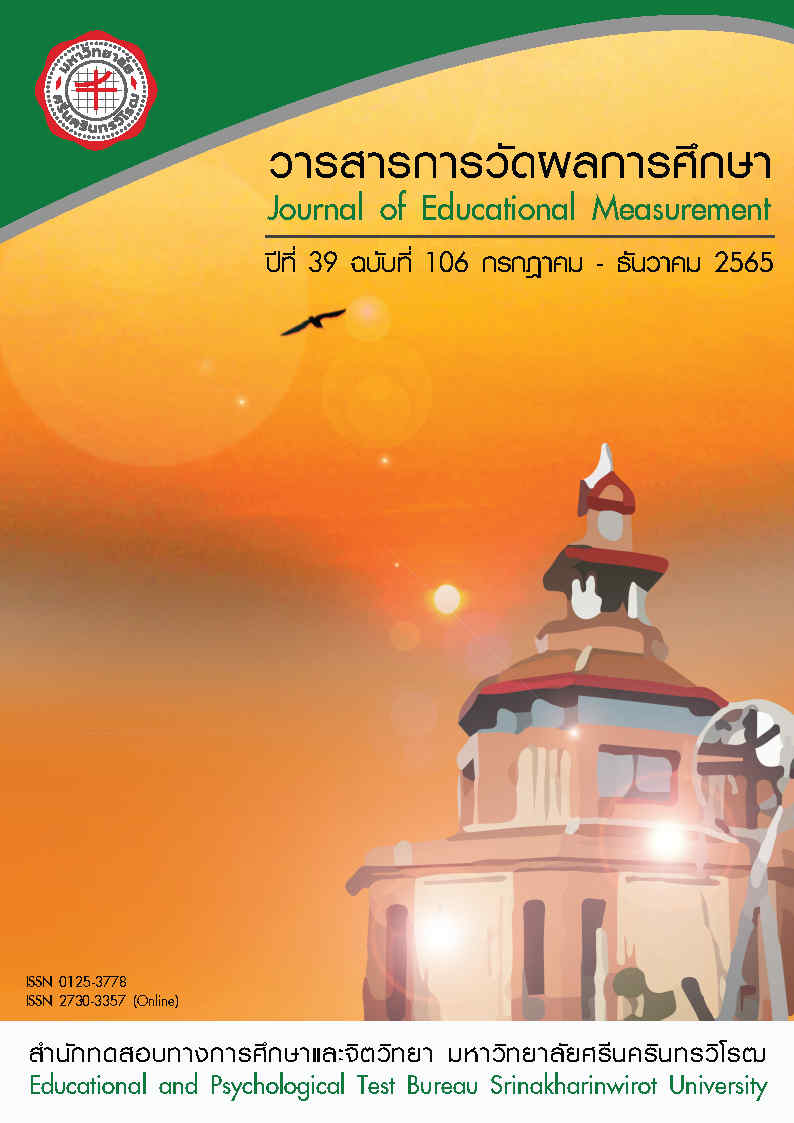การพัฒนาเครื่องมือการวัดระดับทักษะของครูอาวุโสในยุคเทคโนโลยีเปลี่ยนแปลงอย่างฉับพลัน
คำสำคัญ:
ครูอาวุโส, ทักษะของครูอาวุโสในยุคเทคโนโลยีเปลี่ยนแปลงอย่างฉับพลัน, เครื่องมือวัดทักษะในยุคเทคโนโลยีเปลี่ยนแปลงอย่างฉับพลันบทคัดย่อ
การวิจัยนี้มีวัตถุประสงค์เพื่อสำรวจทักษะของครูอาวุโสในยุคเทคโนโลยีเปลี่ยนแปลงอย่างฉับพลัน รวมถึงการพัฒนาและตรวจสอบความตรงของเครื่องมือวัดทักษะ ข้อมูลจากครูอาวุโสจำนวน 178 จากโรงเรียนในสังกัดสำนักงานคณะกรรมการการศึกษาขั้นพื้นฐาน (สพฐ.) ในกรุงเทพมหานคร ได้เก็บรวบรวมและวิเคราะห์โดยใช้สถิติพรรณนา และตรวจสอบคุณภาพของเครื่องมือด้วยการวิเคราะห์ความตรงเชิงเนื้อหา ความเที่ยง ความยาก และอำนาจจำแนก ผลการวิจัยที่สำคัญพบว่า
- ทักษะในยุคเทคโนโลยีเปลี่ยนแปลงอย่างฉับพลันสามารถแบ่งออกเป็น 2 กลุ่มทักษะ ได้แก่ 1) ทักษะการเป็นนวัตกรในยุคเทคโนโลยีเปลี่ยนแปลงอย่างฉับพลันและ 2) ทักษะการทำงานในยุคเทคโนโลยีเปลี่ยนแปลงอย่างฉับพลัน
- แบบวัดระดับทักษะที่ผู้วิจัยพัฒนาขึ้นมีรูปแบบเป็นข้อคำถามแบบเลือกตอบ (multiple choice) จำนวน 27 ข้อ คุณภาพด้านความตรงเชิงเนื้อหาด้วยค่าดัชนี IOC อยู่ระหว่าง .33 – 1.00 คุณภาพด้านความเที่ยง (KR-20)
อยู่ระหว่าง .81 - .82 ซึ่งอยู่ในเกณฑ์ที่เหมาะสม ความยากและอำนาจจำแนกของข้อคำถามอยู่ระหว่าง .2 - .88 และ .21 - .75 ตามลำดับ ซึ่งอยู่ในเกณฑ์ที่เหมาะสม
เอกสารอ้างอิง
ธีรพงษ์ จันทร์ยาง. (2560). การศึกษาความสัมพันธ์ของปัจจัยต่างๆ ที่ส่งผลพฤติกรรมการเรียนรู้ของนักเรียนระดับมัธยมศึกษาปีที่ 2 ของโรงเรียนกรณีศึกษา. วารสารวัดผลการศึกษา.34.47-58.
ภัทราวดี มากมี. (2563). การพัฒนาองค์ประกอบเชิงยืนยันพหุระดับทักษะการเรียนรู้และนวัตกรรม สำหรับนักเรียนระดับมัธยมศึกษาตอนปลาย. วารสารวัดผลการศึกษา.102.138-147.
มารยาท โยยศทอง. (2556). การพัฒนาโมเดลการวัดและโมเดลความสัมพันธ์เชิงสาเหตุของการรู้สถิติของนิสิตนักศึกษาปริญญาตรีที่มีภูมิหลังเป็นตัวแปรกำกับ: การเปรียบเทียบระหว่าง PLS-SEM กับ CB-SEM(วิทยานิพนธ์ครุศาสตร์ดุษฎีบัณฑิต). จุฬาลงกรณ์มหาวิทยาลัย
สุบิน ไชยยะ. (2562). การพัฒนาทักษะการเรียนรู้ตลอดชีวิตของนักศึกษาในศตวรรษที่ 21. วารสารวิชาการศึกษาศาสตร์.20(1). 168-180.
Atmojo, I. R. W., Sajidan, S., Sunarno, W., & Ashadi, A. (2019). The implementation of skill of disruptive innovators to improve creativity through science learning on green biotechnology conceptions. Journal of Physics: Conference Series, 1157, 1–5. https://doi.org/10.1088/1742-6596/1157/2/022004
Barr, R. (2019). Growing Up in the Digital Age: Early Learning and Family Media Ecology. Current Directions in Psychological Science, 28(4), 341–346. https://doi.org/10.1177/0963721419838245
Bongomin, O., Ocen, G. G., Nganyi, E. O., Musinguzi, A., & Omara, T. (2020). Exponential Disruptive Technologies and the Required Skills of Industry 4.0: A Review. Journal of Engineering, 2020. https://doi.org/10.20944/preprints201910.0240.v1
Chin, W. W. (1998). Issues and opinion on structural equation modeling. MIS Quarterly, 22(1), 7-16. https://www.jstor.org/stable/249674?seq=1#metadata_info_tab_contents
Demirel, M., & Akkoyunlu, B. (2017). Prospective teachers’ lifelong learning tendencies and information literacy self-efficacy. Academicjournals, 12(6), 329-337. https://doi.org/10.5897/ERR2016.3119
Dyer, J., Hal, G., & Christensen, C. M. (2019). The innovator’s DNA: Mastering the five skills of disruptive innovators. Harvard Business Review Press.
Farrell, W. C., & Phungsoonthorn, T. (2020). Generation Z in Thailand. International journal of cross cultural management. https://doi.org/10.1177/1470595820904116
Flavin, M. (2017). Free, Simple and Easy to Use: Disruptive Technologies, Disruptive Innovation and Technology Enhanced Learning. Disruptive Technology Enhanced Learning, 19–52. https://doi.org/10.1057/978-1-137-57284-4_2
Gutman, M. (2018). Ethical dilemmas in senior teacher educators’ administrative work. European journal of teaching education, 41(5), 591-603. https://doi.org/10.1080/02619768.2018.1531124
Kock, N. (2019). Applying partial least squares in tourism and hospitality research. Emerald Publishing Limited. http://doi.org/10.1108/978-1-78756-699-620181001
Polat, S., Çelik, Ç., & Okçu, Y. (2019). School Administrators’ Perspectives on Teachers From Different Generations: SWOT Analysis. SAGE Open, 9(3), 215824401986149. https://doi.org/
1177/2158244019861499
Probst, L., Scharff, C., & Francis-Jennings, L. (2018). Upskill: 6 steps to unlock economic opportunity for all. Publisher not identified.
Talmage, C. A., Hansen, R. J., Knopf, R. C., Thaxton, S. P., McTague, Riley, & Moore, D. B. (2019). Unleashing the value of lifelong learning institutes: Research and practice insights from a national survey of Osher lifelong learning institutes. Adult education quarterly, 69(3), 184-206. https://doi.org/10.1177/0741713619834651
World economic forum. (2019). Towards a Reskilling Revolution: Industry-Led Action for the Future of Work. https://www.weforum.org/whitepapers/towards-a-reskilling-revolution-industry-led-action-for-the-future-of-work.



